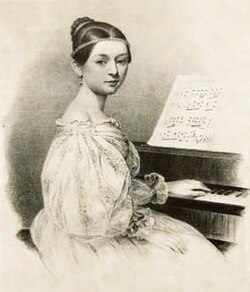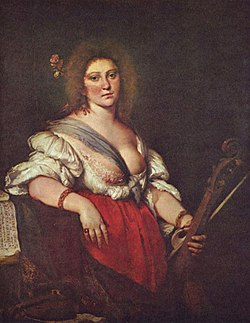
Women composers of Western classical music are disproportionately absent from the music textbooks and concert programs that constitute the patriarchical Western canon, even though many women have composed music. [a]
Contents
- Before 16th century
- 16th century
- 17th century
- 1701–1750
- 1751–1800
- 1801–1850
- 1851–1875
- 1876–1900
- 1900s
- 1910s
- 1920s
- 1930s
- 1940s
- 1950s
- 1960s
- 1970s
- 1980s
- 1990s
- 2000s
- Unknown
- See also
- References
- Notes
- Citations
- Sources
- Further reading
- External links
The reasons for women's absence are various. The musicologist Marcia Citron writing in 1990 noted that many works of musical history and anthologies of music had very few, or sometimes no, references to and examples of music written by women. [1] Among the reasons for historical under-representation of women composers Citron has adduced problems of access to musical education [2] and to the male hierarchy of the musical establishment (performers, conductors, impresarios etc.); [3] condescending attitudes of male reviewers, and their association of women composers with "salon music" rather than music of the concert platform; [4] and denial of female creativity in the arts by philosophers such as Jean-Jacques Rousseau and Immanuel Kant. [5] All this needs to be considered in the perspective of restrictions against women's advancement in cultural, economic and political spheres over a long historical period. [6]
Since such discrimination against women composers can be considered in the context of general societal attitudes about gender or perceived roles of men and women, many musicologists and critics have come to incorporate gender studies in assessing the history and practice of the art.
Some notable Western composers include: Hildegard von Bingen (1098–1179), a German Benedictine abbess, writer, composer, philosopher, Christian mystic, visionary, and polymath; Fanny Mendelssohn (1805–1847); Clara Schumann (1819–1896); Ethel Smyth (1858–1944); Amy Beach (1867–1944); Rebecca Clarke (1886–1979); Germaine Tailleferre (1892–1983); Lili Boulanger (1893–1918); Sofia Gubaidulina (1931–2025); Kaija Saariaho (1952–2023); and Judith Weir (born 1954 and the first woman to hold the office [7] of Master of the King's Music).
Women composers are also listed alphabetically at List of women composers by name.



